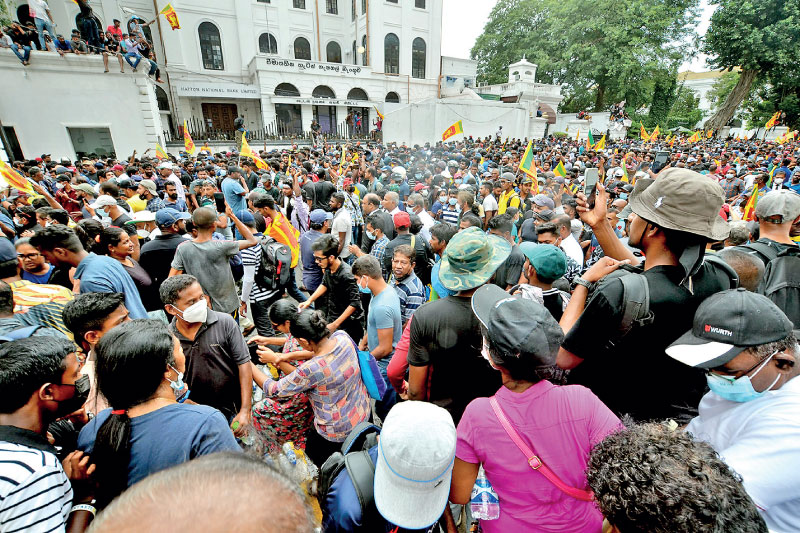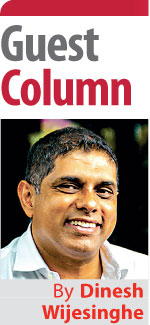Saturday Feb 14, 2026
Saturday Feb 14, 2026
Wednesday, 13 July 2022 00:04 - - {{hitsCtrl.values.hits}}

Once the genie has been let out of the bottle to get the wish delivered, it may not be an easy task to get it back in the bottle again – Pic by Shehan Gunasekara
 The jubilation on the ground is almost palpable.
The jubilation on the ground is almost palpable.
It seems that the declared goal of the #Aragalaya, which was #GoHomeGota, has achieved its purpose of forcibly ousting a President, who was duly elected by the people of this country with a massive majority less than three years ago.
They have also forcibly and illegally occupied the Official Residences of the President and the Prime Minister, the Presidential Secretariat. Some elements from amongst this rampaging mob have set fire to the ancestral private residence of the Prime Minister and reduced it to ashes.
I’ve heard people comparing the events that took place in Sri Lanka on 9 July that led to the incumbent president’s resignation, to the Russian and French revolutions in distant history or the overthrowing of Saddam Hussein and Gaddafi in more recent times.
However, I don’t think many people who make those comparisons and rush to celebrate or justify these events have taken into consideration that this is not some tinpot dictatorship or a monarchy that has been toppled by a popular uprising of oppressed people.
The unimaginable and unprecedented sufferings caused to the people of this country due to shortages of fuel, cooking gas, essential medicines and hyperinflation making even the most basic food items’ prices skyrocketing beyond the reach of the majority of the people is an undeniable fact. So is the fact that these issues, while having been a result of a culmination of contributory factors over the last 74 years since independence, have been exacerbated due to the poor economic management policies of the incumbent President and his Government.
People of this country had surely come to a point of saying “enough is enough” and were rejecting the whole political system of the country.
As per our Constitution, sovereignty of the Socialist Democratic Republic of Sri Lanka lies with the people. There is no argument in that.
What that means is that varying out the will and wishes of the people are delegated by them to what are considered to be the three pillars that hold up a democracy. Namely, the Executive, the Legislature and the Judiciary when it comes to how the country should be governed.
However, by virtue of being a democracy we, the people, are meant to elect our representatives to carry out those bodies to execute their respective duties and therefore our sovereignty must be exercised through those elected individuals and the respective bodies that they represent.
A very basic and simple example to further clarify my argument, if necessary, is that a citizen of this country cannot rob a bank and claim that he has a right to do so as he enjoys sovereignty as per the Constitution. Sovereignty does not give a citizen immunity from committing an illegal act.
I am no constitutional expert. However, as a layman of the subject it is my personal opinion that storming the Official Residence and forcing a duly elected Head of State to flee to safety and resign before the term he has been elected for has expired is an illegal and unconstitutional act that will destabilise the democratic system of governance that we have embraced and adopted since 1948.
I also am quite certain and therefore most afraid, that the precedent this event has created and the ramifications of this action, are going to be reverberating through the political system of this country for many years to come.
I do not believe that those who celebrate the events of Saturday 9 July 2022 as “People’s Victory” have stopped for a moment to consider or analyse the long-term consequences and repercussions of those events and the socio-economic upheaval that is coming our way especially in light of the “Resolve your Political Crisis before resu-mption of talks...” message delivered by the IMF on Sunday.
My personal observation based on discussions I’ve had with many who supported this “popular movement for change” is that most people have had no or a very naive idea about the kind of “System Change’ they were clamouring for.
What started as an apolitical people’s peaceful protest at Galle Face was subjected to a brutal and unprovoked attack by supporters of the former Prime Minister on 9 May this year. The events that unfolded later that day in retaliation to that attack I feel was a turning point in this people’s movement. It allowed more militant elements within the fringes of the democratic system to first infiltrate and then continue on to taking control over the People’s Movement.
The Frontline Socialist Party (FSP) led by Premakumar Gunarathnam, is one such element. It is a breakaway group from the more mainstream JVP, claiming that the JVP had veered off from their revolutionary path. They identify themselves as a Far Left leaning organisation based on communism, Marxism, Leninism, Anti-Imperialism and Revolutionary Socialism. Most of these ideologies have been rejected even by people of the countries that they were conceptualised and pioneered in many years ago.
At a press conference presided over by Gunarathnam on Monday he claimed that the “Victories” gained on the previous day were gained by people exercising their rights by extending their sovereign rights beyond the framework of a dysfunctional and an anti-people constitution, which he claimed is neither valid or relevant in the newly established post 9 July political awakening and the ensuing political climate.
He went on to declare that the #Aragalaya had attained and gained a puritanical political power and influence and any future course of governance must be arrived at, in accordance with the expectations of the new People’s Convention that has emerged from within the #Aragalaya.
While claiming that the mandate given by the people to the President and the Sri Lanka Podujana Peramuna in 2020 to govern the country, stands null and void since 9 July, he asserted that no hitherto established political party will be allowed to conduct their historically adopted methods of manipulating the peoples sovereignty to their benefit and privilege outside of the People’s Convention that emerged on 9 July.
He further emphasised that the buildings currently being occupied by the “People” on the 9th (as named above) will only be handed back once such agreements have been agreed into and incorporated into a people centric new constitution based on the proposals put forward by the “Leadership” of the #Aragalaya and that the SLPP MPs must step out of the way, as their mandate also is considered invalid as of now. That he says will be the beginning of the journey that would lead to the complete overhaul of the existing system of representative governance which has failed to fulfil the truly democratic aspirations of the people.
High ambitions and proclamations indeed and sincere no doubt. However, this brings up a couple of very pertinent questions:
1. Who are these self-appointed “Leaders” of the #Aragalaya that he is referring to?
2. Whose rights are they exercising in dictating and demanding these changes?
At the moment the people who are occupying the President’s Official Residence, the PMs Official Residence and the Presidential Secretariat consist mainly of FSP and what is considered to be the University arm of the same organisation calling themselves the Inter University Students Federation or IUSF or “Antharey” as they are commonly known.
At another press conference called on Monday by the convener of the IUSF, who are currently occupying one of these locations, a person identifying himself as a leader of the #Aragalaya declared that a positive response to their current demands must be met by 13 July. He warned that failure to do so will result in opening the doors of other institutions such as the Parliament “for public viewing” as it is the case with the three locations that they are occupying now.
If anything gained on 9 July by stepping outside the Constitution of the country those gains must definitely be considered illegal or at best moot unless it’s ratified by the Parliament, which as the Legislature is the institution that passes laws of the country through consensus for the Judiciary to protect and uphold the Rule of Law in the country.
Otherwise we open the doors to anarchy and create an unstable and ungovernable country in the guise of “People Power”. I do not believe anyone who supported the #Aragalaya wished or hoped for such a scenario to unfold as a result.
As I write this, 10 people have been hospitalised as a result of a clash that broke out between two parties that are occupying the Temple Trees. There are also reports emerging that the President’s House and Temple Trees, which are strictly public properties, have been vandalised by those who have gained access to them. I, for one, always feared that we as a nation were going to have to face this eventuality, since the attack on #GotaGoHomeGama was by and large a peaceful but effective demonstration of public dissatisfaction with the Government.
The fact that they forced the once revered and all powerful Mahinda Rajapaksa out of office along with the whole Cabinet without resorting to any form of violence is testament to what can be achieved by peaceful yet persistent civic action by a country’s citizenry.
However, the current situation is a far more complicated and chaotic one and it is not going to be an easy task to move forward towards any political solution from this point on, without the FSP and the IUSF trying to impart a decisive influence on matters of governance and policymaking at least in the interim six months to one year period.
I don’t believe that this is the system change the great majority of people envisaged or hoped for to emerge through the #Aragalaya. When I demanded a “system change” (https://www.ft.lk/columns/Let-s-resolve-to-start-the-system-change-that-we-demand-from-within/4-737050) what I was asking for was a better application and transparency of the existing system of Governance and Law and order that ensured a corruption-free, just and equitable society.
Meanwhile, the JVP so far has maintained a stoic silence since the turmoil of 9 July. As far as the time of writing this they have not come out and stated their position on the events of the day or its aftermath.
How they respond to the current political and constitutional crisis will prove to be crucial as they have been comrades in arms with the FSP and a co-instigator/mentor to the IUSF along with the FSP and therefore are certain to have considerable influence over both those parties.
However, they too, like all other major political parties at the moment, have only been merely applying plasters on the festering wound that our economy is today without laying down a clear and definite plan or a road map for overcoming the miserable situation that Sri Lanka finds itself embroiled in today.
The #Aragalaya spearheaded by the FSP and the IUSF have definitely brought about the regime change that most people believed was the best way to find a way out of the economic woes.
That job is all but done now. The rule of law must now be applied and maintained in order to clear the path and move forward with the urgently needed economic and political reforms. However, once the genie has been let out of the bottle to get the wish delivered, it may not be an easy task to get it back in the bottle again.
Reminds me of a saying from Aesop’s Fables – Be careful what you wish for, lest it come true!
The writer is an entrepreneur and investor in the food and beverage industry